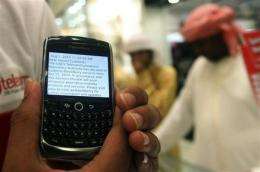With ban looming, some Saudis sell off BlackBerrys

(AP) -- Some Saudis are trying to sell their BlackBerrys ahead of a ban on the smart phone's messenger service in the kingdom - but with few willing to buy, they're having to slash prices.
The Saudi telecoms regulatory agency announced earlier this week the service would be halted Friday. By mid-afternoon, it was still operating. One Saudi newspaper, Okaz, said the halt would begin at the end of the day, at midnight. Saudi officials were not available Friday, a weekend day, to confirm.
The kingdom is one of a number of countries expressing concern that the device is a security threat because encrypted information sent on the phones is routed through overseas computers - making it impossible for local governments to monitor. The United Arab Emirates has announced it will ban BlackBerry e-mail, messaging and Web browsing starting in October, and Indonesia and India are also demanding greater control over the data.
On Friday, Lebanon said it is also looking into whether BlackBerry use raises security concerns there - in part due to allegations that Israeli spies are trying to infiltrate phone networks in Lebanon. This summer, Lebanese authorities charged two employees at the state-owned Alfa mobile phone company with spying for Israel. A third suspect worked for the landline operator Ogero.
Lebanon's main concern is "the ability of our security and judicial groups to access the data ... when it is required by law and when the security situation requires it," Imad Hoballah, the acting head of the Telecoms Regulatory Authority, told The Associated Press in an interview in Beirut.
In Saudi Arabia - which local media say has some 750,000 BlackBerry users - the ban has raised accusations the government is trying to limit freedom of expression.
"The real reason behind the ban is the freedom granted by BlackBerry messenger to its users to criticize, object and mock," columnist Adhwan al-Ahmari wrote in the Al-Watan daily. "Do authorities think that all security breaches will end with the ban of BlackBerry messenger?" he asked, pointing out extremist groups have other ways to communicate.
Saudi Arabia's telecommunications regulator, known as the Communications and Information Technology Commission, announced the imminent ban on Tuesday, saying the BlackBerry service "in its present state does not meet regulatory requirements," according to the state news agency SPA. Saudi security officials fear the service could be used by militant groups. The kingdom has been waging a crackdown for years against al-Qaida-linked extremists.
Saudi Arabia also enforces heavy policing of the Internet, blocking sites both for political content and for obscenities
Expectations of the ban have pushed some to sell their devices. At Riyadh's main mobile phone market, dozens of young men on the street were trying to sell the devices, some in their original packaging, and some running at more than half the normal price.
"Nobody buys it now," mourned Nour al-Zaman, a store owner in the market. Al-Zaman said his shop had cut prices for a new BlackBerry from around $300 to around $100.
Another shopowner in the market, Isam Ali Marsh, said he used to sell seven or eight Blackberrys per day. "Now I don't sell even one BlackBerry," he said.
People have also come in trying to exchange their BlackBerrys for ordinary cell phones, said shopowner Abdul-Ghani al-Owaydi.
"Our lives have been wrecked. We are sitting in our shops doing nothing. We have done nothing to get into such difficult financial situation," al-Owaydi said.
Not everyone was unhappy. Some religious leaders saw the ban as a boost for the ultra-conservative Muslim kingdom's morals. Sheik Mohammed al-Najmi, a cleric involved in a government program that aims to rehabilitate Islamic extremists in prison, said the Blackberry messenger was "dangerous" because some young men get addicted to it.
Also, he said, "there are some porn sites that young men exchange and which are not under any control or surveillance since messages are encrypted."
BlackBerry phones are known to be popular both among businesspeople and youth in the kingdom who see the phones' relatively secure communication features as a way to avoid attention from the authorities.
Analysts say the expansion by the BlackBerry's maker, Canada-based Research in Motion Ltd., into fast-growing emerging markets is threatening to set off a wave of regulatory challenges, as its commitment to keep corporate e-mails secure rubs up against the desires of local law enforcement.
RIM says it does offer help to governments, but says its technology does not allow it, or any third party, to read encrypted e-mails sent by corporate BlackBerry users. The consumer version has a lower level of security.
©2010 The Associated Press. All rights reserved. This material may not be published, broadcast, rewritten or redistributed.




















